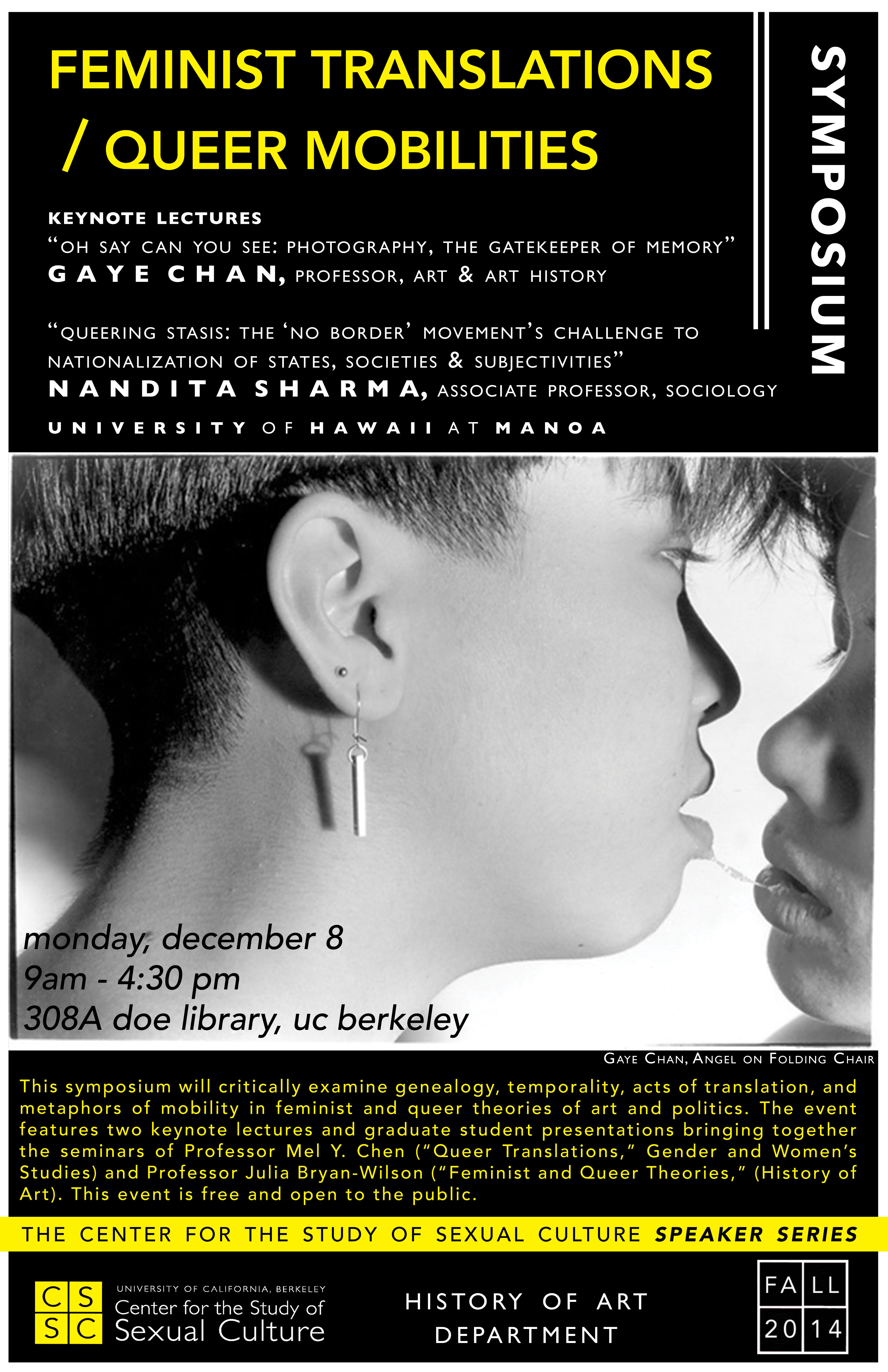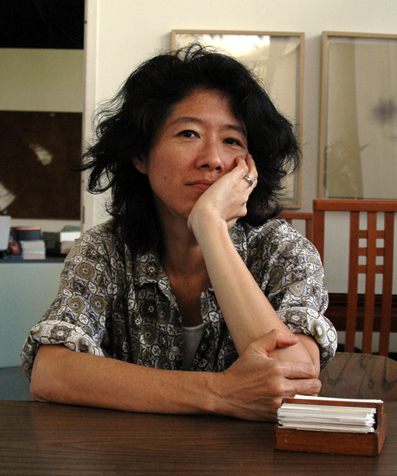 The UC Berkeley Center for the Study of Sexual Culture and the History of Art Department present the daylong symposium Feminist Translations/Queer Mobilities critically examines genealogy, temporality, acts of translation, and metaphors of mobility in feminist and queer theories of art and politics. It will attempt to give equal attention to artists and art objects as to theories, practices and methods, while presuming that the two domains are of course deeply intertwined.
The UC Berkeley Center for the Study of Sexual Culture and the History of Art Department present the daylong symposium Feminist Translations/Queer Mobilities critically examines genealogy, temporality, acts of translation, and metaphors of mobility in feminist and queer theories of art and politics. It will attempt to give equal attention to artists and art objects as to theories, practices and methods, while presuming that the two domains are of course deeply intertwined.
Bringing together the graduate seminars of Professor Mel Y. Chen (“Queer Translations,” Gender and Women’s Studies) and Professor Julia Bryan-Wilson (“Feminist and Queer Theories,” History of Art) to foster trans-disciplinary conversation and debate, this event will feature graduate students presenting their final projects as well as keynote speakers Gaye Chan, Professor of Art & Art History, and Nandita Sharma, Associate Professor of Sociology; University of Hawaii at Mānoa.
Contact cssc@berkeley.edu with any questions. This event is free and open to the public.
SCHEDULE
9:00 INTRODUCTIONS, Julia Bryan-Wilson and Mel Y. Chen
9:15am, KEYNOTE LECTURE: “Queering Stasis: The ‘No Border’ Movement’s Challenge to the Nationalization of States, Societies and Subjectivities,” Nandita Sharma, Associate Professor of Sociology, University of Hawaii at Mānoa
10:20am, PANEL 1: RESIDUE
Brandon Callender, Queer Dreamworks: Privacy and the Black Gay Imagination
Jamal Batts, Black Don’t Crack: Social Death and Contemporary Black Postmortem Photography
Thadeus Dowad, Et in Sicilia ego: Wilhelm von Gloeden & the “Writing” of Queer History
Ace Lerner, Cruising Relationship: Considering Queer Affect
11:30am, PANEL 2: SPINNING
Gracen Brilmyer, Cripping the Digital Archive: Accessibility of Information
Lilith Dornhuber de Bellesiles, The Queer Art of Procrastination
Lyndsey Ogle, Inefficient Performance: Miranda July’s Somebody and the Site of Encounter
Daniel Valella, Spatializing “Intersectionality”: Rurality, Urbanity, and Hetero- and White Normativities in Craig Womack’s Drowning in Fire
2pm, PANEL 3: VELOCITY
Sarah Cowan, Heavy Bodies, Soft Things: Reciprocity in Senga Nengudi’s Early Sculptural Practice
Natalia Duong, Queering the Time of Consumption
Randi Evans, Performance and Queer Temporality: Reconstructing Them
Janell Tryon, The Fiction of Fixity: Maps in Transit
Olivia Young, All Facts Have Been Changed to Protect the Ignorant: The Illusion of Motion in the Work of Senam Okudzeto
3:30pm, KEYNOTE LECTURE: “Oh Say Can You See: Photography, the Gatekeeper of Memory,” Gaye Chan, Professor of Art & Art History, University of Hawaii at Mānoa
4:30pm, CONCLUSION
Keynote Lecture abstracts and speaker bios:
 “Oh Say Can You See: Photography, the Gatekeeper of Memory”: Hawai’i-based artist Gaye Chan has created work across a spectrum of mediums and venues. In this presentation Chan will focus on her photo-based practice that examines how cartography and photography simultaneously offer and occlude information.
“Oh Say Can You See: Photography, the Gatekeeper of Memory”: Hawai’i-based artist Gaye Chan has created work across a spectrum of mediums and venues. In this presentation Chan will focus on her photo-based practice that examines how cartography and photography simultaneously offer and occlude information.
Gaye Chan is a Professor and the Chair of the Department of Art and Art History at the University of Hawai’i. She is a visual and media artist recognized equally for her individual and collaborative work. The latter includes being cofounder of Eating in Public at nomoola.com and DownWind Productions at downwindproductions.com. She was born in Hong Kong and immigrated to the United States in 1969. She received her MFA from San Francisco Art Institute. Her website is here.
 “Queering Stasis: The ‘No Border’ Movement’s Challenge to the Nationalization of States, Societies and Subjectivities”: The last thirty-odd years, precisely when scholarship on migration has flourished, is also the time in which a regime of global apartheid has been intensified. This apartheid is organized through a neo-liberal reorganization of state (im)migration policies whose aim is to increase the number of migrants but limit their mobility, rights and entitlements to the resources of societies that have been nationalized. Yet, despite dramatic increases in precarious forms of migration and the equally precarious situation of many migrants trying to sell their labor, significant political movements initiated by migrants — often those with the most precarious of statuses — have arisen. These, however, are not often discussed as part of the broader social movements (e.g. labour, feminist, anti-racist, etc.) of which, arguably, they are an important, even crucial, part. In my paper, I focus on the emergence of No Borders movements and discuss how they challenge both the material as well as affective organization of our relationships with one another both within and across nationalized spaces. I examine the historical context for the emergence of No Border politics, the relationship of No Borders movements to other ideas and movements and; how arguments for No Borders take up issues of labour organizing and processes of capitalist globalization. I conclude with a discussion of how the emergence of a politics of “No Borders” is an example of new theoretical and practical proposals for emancipatory thought and action that expand our imagination of the
“Queering Stasis: The ‘No Border’ Movement’s Challenge to the Nationalization of States, Societies and Subjectivities”: The last thirty-odd years, precisely when scholarship on migration has flourished, is also the time in which a regime of global apartheid has been intensified. This apartheid is organized through a neo-liberal reorganization of state (im)migration policies whose aim is to increase the number of migrants but limit their mobility, rights and entitlements to the resources of societies that have been nationalized. Yet, despite dramatic increases in precarious forms of migration and the equally precarious situation of many migrants trying to sell their labor, significant political movements initiated by migrants — often those with the most precarious of statuses — have arisen. These, however, are not often discussed as part of the broader social movements (e.g. labour, feminist, anti-racist, etc.) of which, arguably, they are an important, even crucial, part. In my paper, I focus on the emergence of No Borders movements and discuss how they challenge both the material as well as affective organization of our relationships with one another both within and across nationalized spaces. I examine the historical context for the emergence of No Border politics, the relationship of No Borders movements to other ideas and movements and; how arguments for No Borders take up issues of labour organizing and processes of capitalist globalization. I conclude with a discussion of how the emergence of a politics of “No Borders” is an example of new theoretical and practical proposals for emancipatory thought and action that expand our imagination of the
political and of the human.
Nandita Sharma is Associate Professor of Sociology at the University of Hawai’i. Dr. Sharma is an activist scholar whose research is shaped by the social movements she is active in, including No Borders movements and those struggling for the commons. She is the author of Home Economics: Nationalism and the Making of ‘Migrant Workers’ in Canada (University of Toronto Press, 2006). She is also the co-editor (with Bridget Anderson and Cynthia Wright) of a Special Issue of the journal Refuge on “No Borders As a Practical Political Project” (26:2, released Fall 2011/dated Fall 2009). Her website is here.
